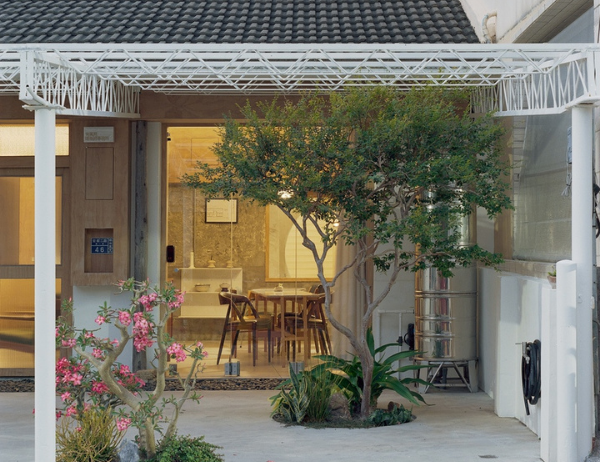Category:
Half Day House / Cabinet YFY
🏡 Project Overview
Architect: Cabinet YFY
Lead Architect: Yu-Hsuan Lin
Location: Kaohsiung, Taiwan
Area: 114 m²
Completion Year: 2023
Photography: Studio Millspace
Project Type: Residential Renovation

🧭 Historical Context and Design Intent
Originally constructed in the 1960s, this building once served as an auxiliary dormitory for the Japanese Navy's Sixth Fuel Factory during the Japanese colonial period. Rather than restoring the structure to its original state or opting for demolition, the renovation aimed to repurpose it into a hybrid space that accommodates both living and working functions.
Architect Yu-Hsuan Lin drew inspiration from Eastern garden aesthetics and personal childhood memories to weave elements of nature, historical context, and spiritual imagination into the design. The objective was to blur the boundaries between these elements, allowing contemporary life to reorganize their relationships within the space.
🌞 Spatial Transformation and Natural Light
Key architectural interventions include replacing portions of the roof with transparent materials and removing several interior partition walls. These changes facilitate the free flow of natural light throughout the multi-level interior.
A central pool acts as a focal point, where sunlight filters through the transparent roof, creating dynamic reflections on adjacent walls and ceilings. The presence of goldfish in the pool adds movement and a poetic quality to the space, enhancing the interplay of light and shadow.
🧱 Layered Spatial Experience
The design emphasizes interconnectedness through strategic openings that create layered visual connections between different areas of the house. From various vantage points, interior spaces overlap and interact uniquely, and even from the street, glimpses of the complex interior layers are visible, establishing a dialogue between the house and its urban context.
At the heart of the home lies a multifunctional area where traditional religious practices, daily meals, casual conversations, and the subtle changes of natural life around the central pool converge. This space embodies the rhythm of daily life, offering moments of stillness and reflection amidst the busyness of work and living.
🔄 Adaptive Reuse and Cultural Continuity
The renovation reflects the dynamic nature of Taiwanese domestic spaces, where spatial relationships and functions evolve over time. By layering materials, styles, and functions from different periods, the design creates a complex and ambiguous spatial environment that honors the building's history while accommodating contemporary lifestyles.